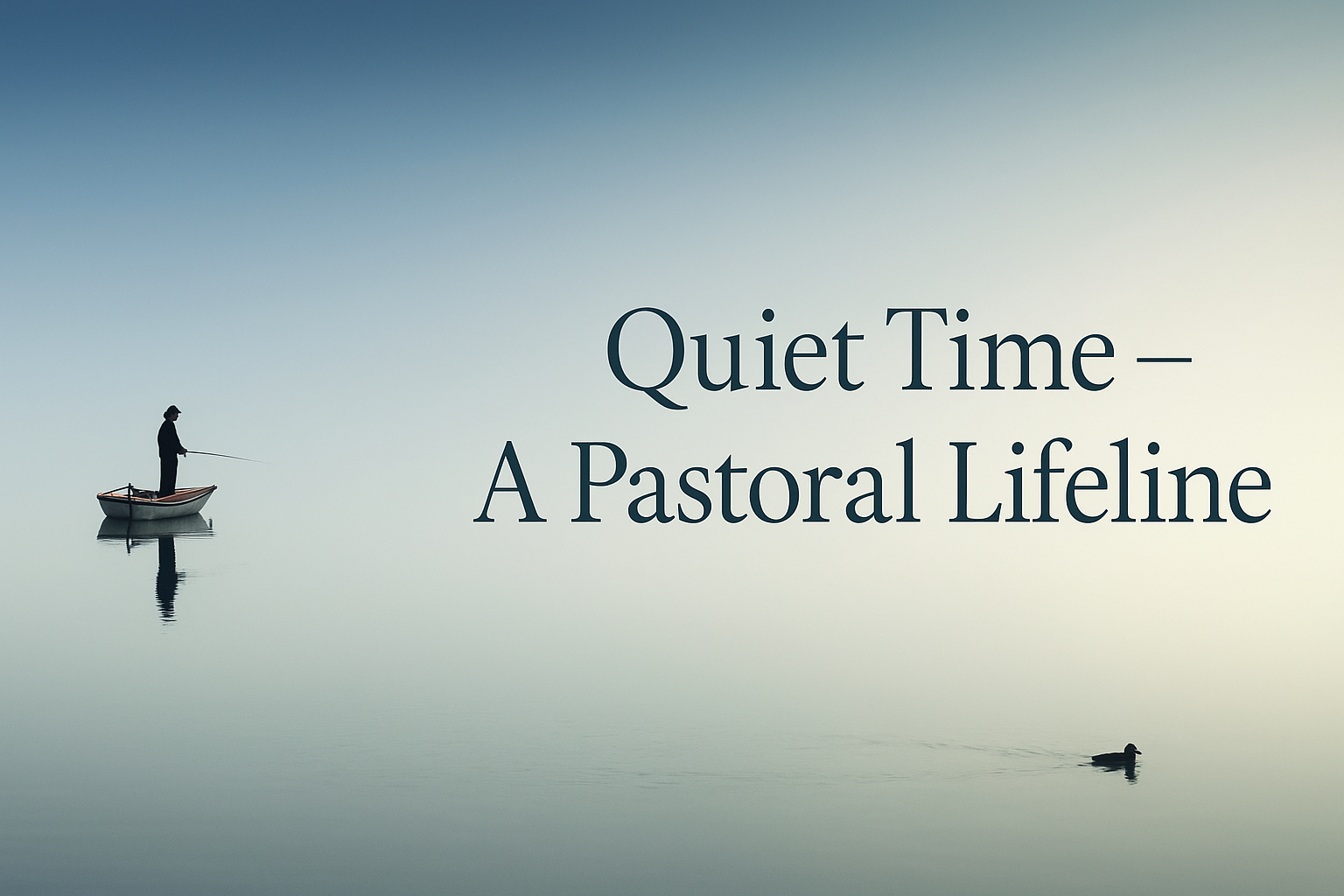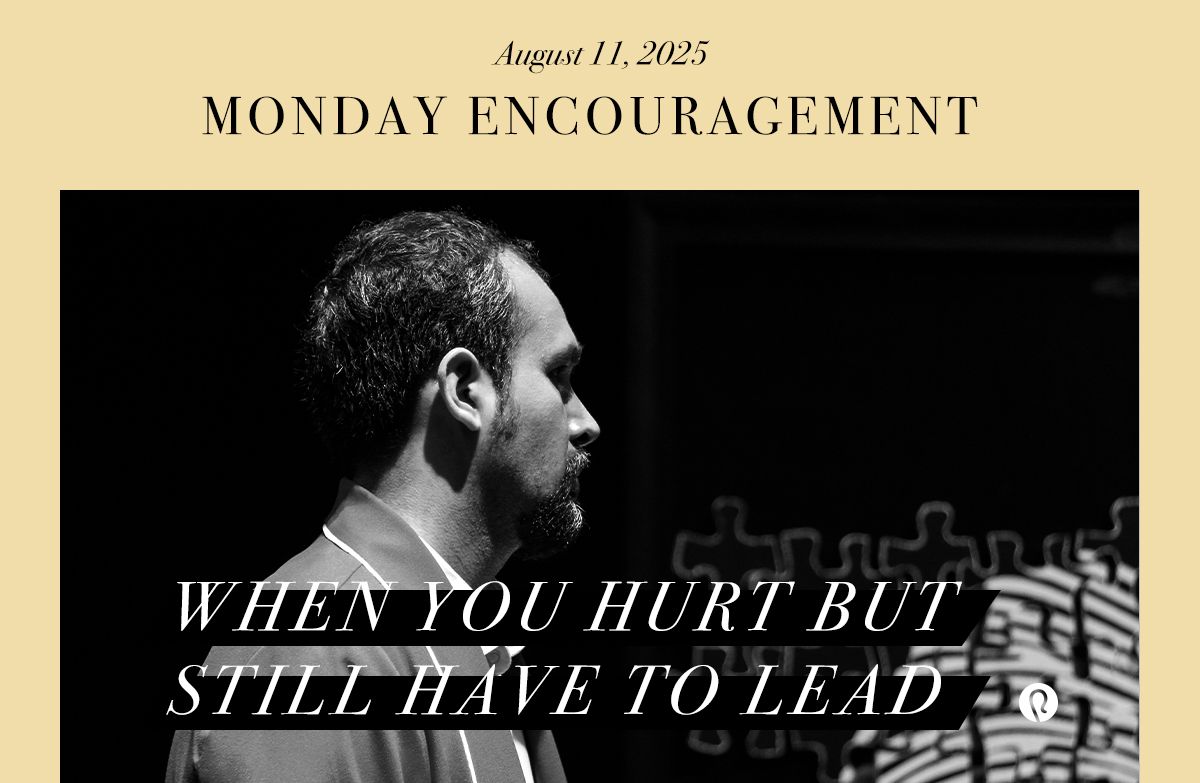We put in long hours, we experience a unique form of loneliness, and we face difficult decisions everyday. It’s easy to get discouraged.
And I think discouragement is one of the most deadly of diseases. Everybody can catch it, and you can catch it more than once. It’s highly contagious and spreads easily and quickly.
But here’s the good news: Discouragement is curable. Whenever I get discouraged, I head straight to Nehemiah. This great leader of ancient Israel understood there were four reasons for discouragement in ministry.
Fatigue
You simply get tired as the laborers did in Nehemiah 4:10. We’re human beings, and we wear out. You cannot burn the candle at both ends. So if you're discouraged, it may be that you don’t have to change anything. You just need a vacation! Sometimes the most spiritual thing you can do is go to bed.
Frustration
Nehemiah says there was rubble all around. So much that it was getting in the way of rebuilding the wall. Do you have rubble in your ministry? Have you noticed that anytime you start doing something new, the trash starts piling up? If you don’t clean it out periodically, it’s going to stop your progress. You can’t avoid it, so you need to learn to recognize it and dispose of it quickly so you don’t lose focus on your original intention.
Now, what is the rubble in your life? I think rubble is the trivial things that waste your time and energy and prevent you from accomplishing what God’s called you to do. It could be committee meetings. It could be television. It could be just about anything that turns you away from God’s purposes.
Failure
The laborers in Nehemiah were unable to finish their task as quickly as originally planned, and as a result, their confidence went down the drain. They were thinking, "We were stupid to think we could ever rebuild this wall." And you might be thinking, "I was dumb to ever think I could lead this church. I can’t do it any more.” You feel like a failure.
But you know what I do when I don’t reach a goal on time? I just set a new goal. I don’t give up. The fact is—if you’re in the ministry, you’re going to fail. Everybody fails. Everybody does dumb things. So the issue is not that you failed—it’s how you are going to respond to your failure. Do you give into self-pity? Do you start blaming other people? Do you start complaining, "It’s impossible?" Or do you re-focus on God’s intentions and start moving again?
Fear
Nehemiah 4:11 says this: "Also our enemies said, 'Before they know it or see us we will be right there among them and will kill them and put an end to their work.'” You know the background to this story. You’ve preached on Nehemiah before, and you know there were people who did not want the wall to be rebuilt. They were doing everything they could to keep that from happening. First, they criticized the Jews, and then they ridiculed the Jews. When that didn’t work, they threatened the Jews.
Notice who gets fearful the quickest: "Then the Jews who lived near them came and told us ten times over, `Wherever you turn, they will attack us’” (Nehemiah 4:12). The people most affected by fear are those who hang around negative people. If you’re going to control the negative thoughts in your life, you’ve got to get away from negative people as much as you can. It’s like the old saying, “If you’re going to soar with the eagles, you can’t run with the turkeys.”
Let me ask you this: What fear is causing you to be discouraged? The fear of criticism? Embarrassment? Fear that you’re not capable of the task? That you can’t handle pressure? How can you tell when fear is causing discouragement in your life?
It’s simple. You have an intense desire to run! “I’ve got to get out of this! I’ve got to leave the ministry! I’ve got to leave this church!” Yet, I’ve learned in life that it’s rarely God’s will for me to run from a difficult situation. If you don’t learn in one place, guess what? God just gives you another chance to learn somewhere else. Otherwise, you just jump from the frying pan into the fire. Running from fear only makes it bigger. So, don’t try to escape from life’s pressures.
If you’ll just hang in there, you’ll outlast that carnal person who’s giving you so much trouble in your church. But it’s important that you stick it out. A friend of mine in Los Angeles says, “When you go to a new church, the first year is the honeymoon. The pastor can do nothing wrong. The second year, usually the pastor can do nothing right. The third year, usually, somebody has to go. And it may be that just like God had to kill off a couple million Jews in the desert before he’d let them go into the Promised Land, God may have to move some people out of your church before he fulfills the vision he’s given you.” Never give up.
Reflection:
What is it that causes discouragement in your life? Maybe you’re just fatigued. You’re just out of energy. It was the most relaxing day of my life when I resigned as General Manager of the universe. I realized something: the world did not fall apart the day I did that. I felt like I was Atlas—the whole world was on my shoulders. Would you relax and take a deep breath right now and just let it out and let God drain that stress out of your life? Let God take those pressures, those problems, those people, those circumstances, those critics, those challenges, and those impossible situations.
Take a deep breath and just let it out. And rest. Maybe you need to take a vacation. I read a statement the other day that was a great stress reliever to me. “No football team in history ever won a game without substitutions.” If you feel like you have to be there every Sunday, you’re wrong. Maybe you need to start a regular exercise program. For instance, try walking. If you walk two miles a day, you’ll get more energy. Maybe you need to start watching your nutrition, or develop a hobby—something you enjoy so much you’re willing to leave your work for it. And sometimes that’s hard to do when you love the ministry as much as we do. But you need it if you’re going to last in the ministry.
Maybe you have frustration in your life and that’s why you’re discouraged. Rubble has piled up and your desk is heavy with work, deadlines, and commitments. You’re trying to burn the candle at both ends. What you need to do is re-organize your life. Say, “God, help me see that I’m not doing the wrong thing. I’m just doing it in the wrong way.”
Maybe you’re discouraged because you feel like a failure. You say, “I’ve been in this place for six months (or six years), and I feel like I’m treading water.” You’re never a failure if what you’re doing is ultimately for the glory of God. Maybe God’s just been trying to teach you some lessons. He wants you to stay there but to do things in a different way. Maybe he wants you to move on. Only God can tell you when to let go and when to hold on. But never give up on your dream! If you feel like you’re a failure, listen to this: “There is, therefore, no condemnation for those who are in Christ Jesus.” God does not condemn you. God loves you. God’s not mad at you. God is on your side. “If God be for us, who can be against us.” One plus God equals a majority.
One of the great truths of Scripture is that God is the God of second chances, and he lets you start over. He says, “I will restore the years that the locusts have eaten.” If you would commit yourself and say, “Christ, whether I have five or fifty years left, I want to commit it to you. I want to renew my life commitment to you right now. Lord, whether you take me home next week or in 50 or 60 years, I want the rest of my life to be the best of my life.”
Maybe you’re discouraged because of fear. You’re dealing with fears like, “I can’t handle this. It’s too much responsibility.” Maybe it’s the fear that you don’t deserve it. It’s the fear of criticism. Fear will destroy your life, if you let it. But you can choose to resist the discouragement. Say, “God help me get my eyes off the problem—off the circumstance—and keep my eyes on you.” Tension is a warning light that you have taken your eyes off the Lord. When you get tense, it’s God saying, “You’ve lost your focus.” “Thou wilt keep him in perfect peace whose mind is stayed on Thee.”
Resist the devil and his discouragement. Recognize where it’s coming from—the answer may be just around the corner. Anybody who watches basketball knows that the game is often won in the final second.
Pray this prayer: Heavenly Father, I thank you that your work done your way will not lack your support. I thank you that you can use me in a significant way. Lord, help me have a new vision and new inspiration that comes, not from motivation or psychology, but from knowing you. Help me realize that sometimes you have to make me lie down in green pastures in order to get my attention. Help me spend some time by those still waters that will restore my soul. Lord, I look to you for strength. I thank you that—for whatever it is that you’ve called me to do—you will bring it to pass. I thank you that I can be confident of this, that you who began a good work in my life will bring it to completion in the day of Christ. In Jesus’ name. Amen.







